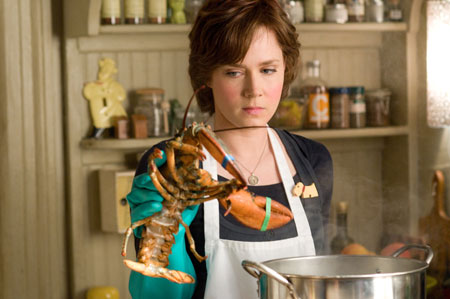Julie & Julia

In 1961, Julia Child published Mastering the Art of French Cooking. This film explores who she was before her magnum opus hit bookshelves, but that isn’t the focal point of the story—written by the real Julie Powell, adapted for the screen and directed by Nora Ephron.
Instead, the narrative revolves around Julie Powell (Amy Adams), a gal living in New York, working for a lower Manhattan development corporation handling calls from relatives of 9/11 victims. The film gets us there, but not before introducing us first to Julia Child (Meryl Streep) upon her arrival in Paris, France, 1949. Her husband Paul (Stanley Tucci) has been stationed there, working for the Office of Strategic Services of the United States.
The story parallels the lives of Julie and Julia, as the title suggests, each who have arrived at their destinations under serendipitous circumstances, before having determined their calling in life. In the present, 2002, Julie finds the monotony of her job grating. Her husband suggests blogging about her experiences or other passions. The connection between the two principals is that both Julie and Julia love food. This leads them both to explore cooking as an outlet for expression they otherwise do not find possible in their daily lives. Of course Mrs. Child had considerably greater finances at her disposal… but I digress.
The two are very methodical, scientific types. When Julie takes a fascination in Mrs. Child’s book and decides to attempt to conquer 524 of Child’s recipes in 365 days, and blog about her efforts to do so, she undertakes the task with a mathematical precision. But that of course sets the stage for the element of dramatic conflict that leads to the inevitable catharsis. Huh? Allow me to elaborate…
Julie lives vicariously through the gastronomical discoveries of Mrs. Child. She says she feels as if Julia is speaking to her, tutoring her in the ways of culinary arts. At times she seems obsessed and, just as I have found with writing movie reviews, there comes a point when what was a hobby becomes a monster which preoccupies and overtakes your life. When it becomes work, it’s time to step back and re-evaluate your objectives.
Julia appears to take a genuine interest in sharing her excitement about food with others. Along with her partners, Louisette Bertholle (Helen Carey) and Simone Beck (Linda Edmond), Child sets out to teach “servantless” Americans how to cook French cuisine which ordinarily takes considerable preparation. Her jovial attitude is what Julie initially lacks. Cooking is a joy, not an academic exercise.
As Roger Ebert, and others I’m sure, have pointed out, Julie’s blog is fairly self-indulgent. Rightly so that her husband, Eric (Chris Messina), questions her motives and goals. Blogs, he says, are utter narcissism, “Me, me, me, day after day.” But this is all part of the character development. Eventually she realizes that this is more than an exercise in back-patting. After exhausting the mechanics of trudging through all of the recipes and reporting on the results, it finally occurs to her that the most important lesson to learn is to have passion in one’s life for something, anything.
The film is mired in some absurdities, such as the strange friends Julie keeps—ridiculous stereotypes of urban go-getters. So exaggerated are these bloviating women that I thought I was watching “Sex and the City” for a moment. However, these quibbles don’t stop the movie from being entertaining. And while I’ve never been a fan of Meryl Streep, who each year receives heaps of praise for playing some variation of herself in almost every movie she’s in, I will say she does a fine job of capturing the essence of the plucky, fastidious yet charming Julia Child. It’s also delightful seeing the re-creation of 1950’s France in colors and tones so delicately photographed, the opening shot at first looks like a painting. Amy Adams is so meek she echoes Cynthia Nixon’s waif servant in Forman’s Amadeus. In fact, for a moment I thought she was Ms. Nixon, until I remembered that Amadeus was twenty-five years ago.
The Julia Child vignettes do their part to bang a steady political drum throughout. “A Republican would fire you. I am not a shmuck,” says Paul’s superior, in one of many examples of the ham-fisted attempts to inject political commentary into a film that should focus its energies on the joys of cooking. References to McCarthyism abound, but they are warranted in part by the fact that Paul becomes a target for government scrutiny simply because he is a well-traveled man. At some point it is insinuated that “their kind” are disliked. He never quite comes out and says it, but under the surface of the dialogue murmurs the refrain, Conservatives hate intellectuals and the pursuit of knowledge. All power-mongering factions do. The decentralization of information is the greatest threat to tyranny. Thank goodness for the internet.
 Julie & Julia • Dolby® Digital surround sound in select theatres • Running Time: 123 Minutes • Aspect Ratio: 1.85:1 • MPAA Rating: PG-13 for brief strong language and some sensuality. • Distributed by Columbia Pictures
Julie & Julia • Dolby® Digital surround sound in select theatres • Running Time: 123 Minutes • Aspect Ratio: 1.85:1 • MPAA Rating: PG-13 for brief strong language and some sensuality. • Distributed by Columbia Pictures